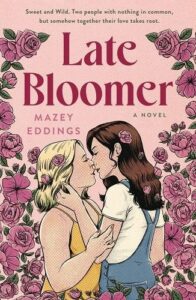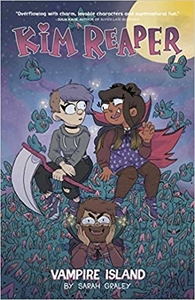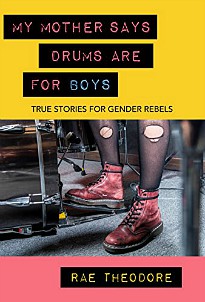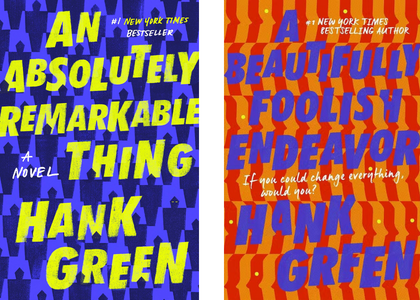Buy this from Bookshop.org to support local bookstores and the Lesbrary!
“I wish I could say it gets better, but it only gets worse.”
“Nothing says love like Taylor Swift.”
There is a lot to like about Late Bloomer by Mazey Eddings, but these two lines are what made the book stand out for me. In context, the first line is spoken by one main character, who is 26, to the other, who is 24. Later on, when Opal, the 24-year-old, says the line about Taylor Swift, Pepper replies, “Aren’t a lot of her songs about heartbreak?”
“Absolutely do not get me started,” is both Opal’s retort and what I would say in response to someone bringing up either of these topics. I have a lot of thoughts on these topics, and that is certainly part of what made me enjoy Late Bloomer so much.
Late Bloomer is set outside of Asheville, North Carolina, on a flower farm named Thistle and Bloom. Opal wins the lottery, buys the farm, moves from Charlotte to Asheville, and discovers that her new home is very much still occupied by Pepper. As it turns out, Pepper has had the farm sold out from under her by her ne’er do well mother because of something something probate. Hijinks ensue. There are two ways to approach the setting and exposition of Late Bloomer: 1) If you love flowers and/or Asheville, then you’re going to love the entire backdrop of this book. 2) If those things do not matter to you as much, throwing Opal and Pepper together in a house without “adult supervision” is more than enough to drive the story forward.
So about that 26-year-old giving sage advice to a 24-year-old… truthfully, it was not my favorite. Have I once upon a time said something similar in a similar situation? Probably more than once. It’s the kind of thing that isn’t meant to be overheard by someone who wasn’t entirely sure if their back was going to cooperate this morning. That’s okay, though. More importantly, this interaction made me realize something: I think Late Bloomer is the first romance I’ve read where both characters are Gen Z. I’ve read plenty of books with Millennial/Millennial pairings as well as Gen X/Millennial and Millennial/Gen Z pairings, but I think this is the first Gen Z/Gen Z romance.
To be clear, this is a good thing. No one in this book owns a coffee shop (not that there’s anything wrong with that!), and neither main character is remotely close to having children—or having their life together, for that matter. Pepper is autistic, and Opal has ADHD. (Unless she’s also autistic. Opal tells Pepper that, because medical tests are expensive and there’s a lot of overlap between the two, that she didn’t bother getting a diagnosis. Again, no one owns a coffee shop.) These two characters allow Eddings to talk about ADHD and autism in ways that I don’t often see from Gen Xers or Millennials. Eddings’s characters felt more real to me than many of the characters I’ve read in other romances lately. If someone told me that people like these characters existed in real life, I would definitely believe it. And while I know that romance is not the best place to go for realism, it works in Late Bloomer.
Also, there’s a flower sculpture contest, so it’s not like I’m saying the book is bereft of whimsy.
Speaking of which, what’s up with the number of romances out there that invoke Taylor Swift’s name? Not just the first and last name—it’s important that Alison makes it onto the page as well. Swift’s middle name has somehow become the vehicle by which someone can emphasize just how powerful Swift truly is. (I’m certainly not denying that; shortly after the release of folklore in 2020, I began referring to her as “the bard.”) And the Swift references as book titles! In just the past two months, I’ve read Don’t Want You Like a Best Friend by Emma Alban and How You Get the Girl by Anita Kelly. Eddings gets in on the fun as well, which readers discover as part of the author’s note in Late Bloomer. I’ll admit that my favorite part of the book is probably “Anatomy of a Title,” in which Eddings reveals that one of the possible titles for Late Bloomer was—you guessed it…
“Lavender Haze.”
I really needed to get that whole Taylor Swift thing off my chest. More importantly, the insight that Eddings provided into that part of the writing process was a treat.
What I’m trying to say is that Late Bloomer has a lot of depth to it. I like the stories that follow tropes in a way that is predictable and comforting, yes, but it is also fun when an author adds something that I don’t come across that often. Or, in the case of the bard, something I see a lot of but approached in a way that’s different and makes me laugh. Late Bloomer is an easy recommend, and—if it matters to you one way or the other—it’s also one of spicier romances that I’ve read this year.
Liv (she/her) is a trans woman, a professor of English, and a reluctant Southerner. Described (charitably) as passionate and strong-willed, she loves to talk (and talk) about popular culture, queer theory, utopias, time travel, and any other topic that she has magpied over the years. You can find her on storygraph and letterboxd @livvalentine.



